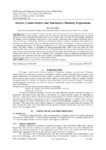Please use this identifier to cite or link to this item:
http://thuvienso.bvu.edu.vn/handle/TVDHBRVT/19087| Title: | Factive, Contra-factive and Non-factive Modality Expressions |
| Authors: | Ho, Van Han |
| Keywords: | Factive Contra-factive Non-factive Proposition |
| Issue Date: | 2018 |
| Publisher: | IOSR Journal Of Humanities And Social Science |
| Series/Report no.: | Volume 23, Issue 7, Ver. 1 (July. 2018);pp. 66-69 |
| Abstract: | In a state of affair, a speaker typically asserts the (un)truth of a proposition because his volition indicated to mark a presupposition about what he said. What he said is possible for what happens, happened, will happen in real or imaginary world. For this view, the duty of the hearer must consider whether the state of affair is factivity or nonfactivity. Factivity or nonfactivity usually is implied commitment the (un)truth of a proposition or (un)occurrence of an event through modal predicatives. For instance, (1) I know she has arrived. (2) I think she has arrived. The factivity or nonfactivity in (1) and (2) is committed by the modal predicatives ‘know’ and ‘think’. ‘Know’ is considered the strong commitment while ‘think’ is the very weak one of the speaker to the truth of what he said (she has arrived). From this point of view, we first investigate and analyze some of factual and nonfactual modal verbs systematized by Cao Xuan Hao (1999), then we conduct them to see whether they exist in the same way in different types of utterances based on analyzing presupposition and implicature. The results show that there is no complete sustainability of distinction between the word system of factual modality and the word system of nonfactual modality. |
| URI: | http://thuvienso.bvu.edu.vn/handle/TVDHBRVT/19087 |
| ISSN: | 2279-0837 |
| Appears in Collections: | Sau Đại học (Articles) |
Files in This Item:
| File | Description | Size | Format | |
|---|---|---|---|---|
| Ho-Van-Han-1.pdf | 163,16 kB | Adobe PDF |  Sign in to read |
Items in DSpace are protected by copyright, with all rights reserved, unless otherwise indicated.